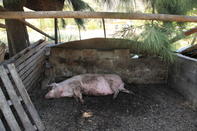When talking to other pig farmers, they will tell you that pigs often don’t show any symptoms of disease, with sudden deaths or higher mortalities being the only indication that something is wrong.

The problem is that there may be various reasons why a pig may be found dead without any apparent cause or previous signs of illness, making it extremely important that the cause of death is identified to prevent further losses. Best, especially if you are still a novice, is to ask a veterinarian or animal health technician to help identify the cause of death, by doing an autopsy and or taking blood samples.
The rise in digital technology is even making it possible to consult veterinarians and animal health technicians telephonically and send them pictures that would help with diagnostics. Sudden death may be due to injury, trauma, heart failure, porcine stress syndrome, disease or poisoning.
Heart Failure
The South African Pork Producers Organisation in its production manual, Pigs for Profit, identifies heart failure as one of the main causes of sudden death. Heart failure, according to the manual, usually occurs due to a heart defect in young piglets or heart disease in older pigs.Porcine Stress Syndrome
Porcine stress syndrome is a genetic disorder that results in pigs dying suddenly due to heart failure because of an inability to cope with physical stress; for example if overcrowded, due to heat stress, or during transportation, or pre-slaughter.
Animals affected by the disorder tend to develop pale, soft and exudative meat that results in economic losses. To prevent this disorder, farmers should use breeding stock that does not carry this gene.
Disease
Various infectious diseases and conditions may result in sudden death, including Classical or African Swine Fevers and bacterial and viral diseases that cause septicaemia, acute pneumonia or diarrhoea. It is important to get a formal diagnosis to correctly identify the cause of death and prevent further losses.
The majority of infectious diseases and conditions can be prevented through good biosecurity and hygiene measures, by feeding pigs a healthy balanced diet and limiting the stress of the animals as far as possible. Vaccines exist to prevent some of these diseases but should be stored and administered as instructed for the best results.
Consult a veterinarian or animal health technician on the correct treatment of these diseases, which may range from antibiotics to the culling of sick pigs if no treatment exists.
Poisoning
Pigs may die of poisoning, because of an overdose of medicine, they ate a poisonous plant or there is something toxic in their water or feed. To identify the cause of poisoning, farmers are advised to study the history of the pigs, by looking at which pigs are affected and identifying changes in their routines or to their feed or water.
Pigs may, for example, die because of an overdose of salt if they are fed food with high sodium levels. The following toxins have been identified that may be associated with sudden death: algae; certain plants; salt, arsenic; selenium; coal tars; copper; ethylene glycol; herbicides; iron dextran; certain insecticides, incorrect dosage of certain medicines; warfarin and toxic gasses, such as carbon monoxide and hydrogen sulphide.
Ask a veterinarian or animal health technician to help you identify the cause of death and get rid of the cause to prevent more losses.
By Glenneis Kriel